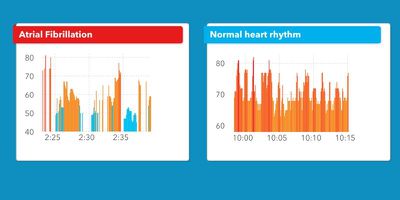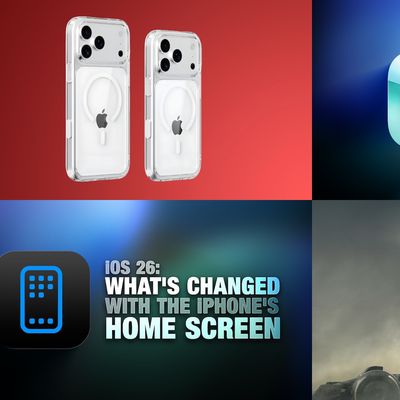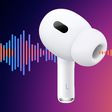Apple Watch Able to Detect Abnormal Heart Rhythm With 97% Accuracy
The Apple Watch's built-in heart rate monitor is 97 percent accurate when detecting the most common form of an abnormal heart rhythm when paired with an algorithm to sort through the data, according to a new study conducted by the University of California, San Francisco and the team behind the Cardiogram app (via TechCrunch).
There were 6,158 participants in the study, all of whom used the Cardiogram app on the Apple Watch to monitor their heart rate. Most were known to have normal EKG readings, but 200 suffer from paroxysmal atrial fibrillation (an occasional irregular heartbeat).

Data from these participants, along with data taken from normal Cardiogram users, was used to build a neural network that could recognize the abnormal heart rhythms solely from data collected by the Apple Watch. As of today, Cardiogram says its algorithm can almost always successfully determine when a patient is in atrial fibrillation.
In order to validate the model, we obtained gold-standard labels of atrial fibrillation from cardioversions. In a cardioversion, a patient experiencing atrial fibrillation is converted back to normal sinus rhythm, either chemically or with a shock to the heart. 51 patients at UCSF agreed to wear an Apple Watch during their cardioversion.
We obtained heart rate samples before the procedure, when the patient was in atrial fibrillation, and after, when patient's heart was restored to a normal rhythm. On this validation set, our model performed with an AUC of 0.97, beating existing methods.
Cardiogram is a startup that's aiming to garner more information from the data collected by the Apple Watch. The study, which Cardiogram has raised funding for, started in March of 2016 and will continue as UCSF and Cardiogram work to refine the neural network and detect other conditions beyond atrial fibrillation.
Cardiogram plans to put in additional work before using its algorithm to start notifying Cardiogram users of arrhythmias. The company needs to conduct further testing to make sure the algorithm works in a variety of conditions and it needs to work on scaling it so it can be used continuously by all Cardiogram users.
The Cardiogram app can be downloaded from the App Store for free. [Direct Link]
Popular Stories
A new Apple TV is expected to be released later this year, and a handful of new features and changes have been rumored for the device.
Below, we recap what to expect from the next Apple TV, according to rumors.
Rumors
Faster Wi-Fi Support
The next Apple TV will be equipped with Apple's own combined Wi-Fi and Bluetooth chip, according to Bloomberg's Mark Gurman. He said the chip supports ...
Apple will launch its new iPhone 17 series in two months, and the iPhone 17 Pro models are expected to get a new design for the rear casing and the camera area. But more significant changes to the lineup are not expected until next year, when the iPhone 18 models arrive.
If you're thinking of trading in your iPhone for this year's latest, consider the following features rumored to be coming...
Apple's next-generation iPhone 17 Pro and iPhone 17 Pro Max are only two months away, and there are plenty of rumors about the devices.
Below, we recap key changes rumored for the iPhone 17 Pro models.
Latest Rumors
These rumors surfaced in June and July:A redesigned Dynamic Island: It has been rumored that all iPhone 17 models will have a redesigned Dynamic Island interface — it might ...
The long wait for an Apple Watch Ultra 3 is nearly over, and a handful of new features and changes have been rumored for the device.
Below, we recap what to expect from the Apple Watch Ultra 3:Satellite connectivity for sending and receiving text messages when Wi-Fi and cellular coverage is unavailable
5G support, up from LTE on the Apple Watch Ultra 2
Likely a wide-angle OLED display that ...
iPhone 17 Pro and iPhone 17 Pro Max models with displays made by BOE will be sold exclusively in China, according to a new report.
Last week, it emerged that Chinese display manufacturer BOE was aggressively ramping up its OLED production capacity for future iPhone models as part of a plan to recapture a major role in Apple's supply chain.
Now, tech news aggregator Jukan Choi reports...
The iOS 26 public beta release is quickly approaching, while developers have recently gotten their hands on a third round of betas that has seen Apple continue to tweak features, design, and functionality.
We're also continuing to hear rumors about the iPhone 17 lineup that is now just about right around the corner, while Apple's latest big-budget film appears to be taking off, so read on...



















